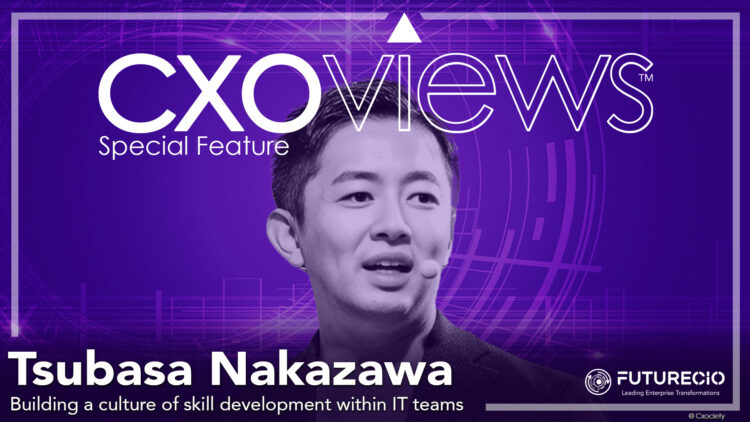In the ever-evolving IT industry, change is the only constant. As technologies rapidly progress, what's relevant today could easily become outdated tomorrow.
"In this fast-paced environment, tech professionals must stay ahead of the curve to remain competitive and relevant. Complacency is not an option, as the skills and knowledge that were once highly valued can quickly become outdated. The ability to adapt and continuously learn is no longer a luxury but a necessity for those seeking long-term success in the tech industry," an article from the Institute of Data posits.

Fostering a learning culture
Recognising this pace of change, Tsubasa Nakazawa, managing director of Kintone Southeast Asia, highlights the importance of building a culture of skill development within IT teams.
"To build a culture of skill development is to create an environment where continuous learning and professional growth are embedded into everyday work," Nakazawa explained. "In the context of IT, technology development is something constantly moving at lightning speed. Hence, it's crucial for not only IT professionals but also members without a comprehensive IT background to upskill themselves every day. That means the company culture must also adapt that way."
He emphasises that this kind of environment thrives when there is a mindset that values both current expertise and the potential to grow. "The way to do it is by fostering a mindset that values both the current expertise and the potential to adapt and grow."
Leaders, he said, must actively encourage team members "to pursue fresh knowledge, experiment with different approaches, and share their insights openly." He also advocates for an open communication culture where everyone is encouraged to speak up and learn from one another's experiences.
"Seeing the efforts of peers can be highly motivating while understanding the learning progress of others can help team members calibrate their own development goals," Nakazawa added. Such transparency, he said, fosters mutual support and continuous improvement, promoting collective evolution rather than just individual growth.
At Kintone, the implementation of a learning culture has yielded significant benefits. Nakazawa shared that it has improved employee engagement and helped teams better align with evolving business needs. "Ultimately, a strong learning culture supports innovation, reduces turnover, and makes teams more resilient to change," he said, underlining the positive impact of such a culture.
Addressing barriers to learning
Across Southeast Asia, Nakazawa observes a growing awareness of the importance of continuous skill development. However, he acknowledges there are still hurdles.
"Certain obstacles like legacy work cultures, where employees focus only on tasks within their fixed-job scope, budget limitations, or an emphasis on short-term results still exist," he noted.
Despite this, Nakazawa is optimistic. "The exciting part is that the barriers to fostering a culture of learning are far from insurmountable. More companies are discovering that skill development doesn't always require large budgets or formal training programs."
He pointed to practical changes that companies are adopting, such as embedding learning into daily workflows, promoting mentorship, and encouraging cross-team knowledge sharing. According to him, there's a growing momentum in the region to treat learning as a strategic investment in both talent and innovation.
"With the right mindset and a few intentional actions, businesses can unlock the full potential of their teams and build a more resilient, future-ready workforce," he said.
Skills for an ever-evolving tech landscape
When it comes to improving IT performance, Nakazawa believes that technical expertise and human-centred skills must go hand in hand.
On the technical side, he said teams should develop proficiency in cloud computing, cybersecurity, data analytics, and AI-driven tools. "As more organisations embrace digital-first models, capabilities in DevOps, automation, and low-code/no-code platforms have become increasingly sought after. These competencies form the foundation for reliable, scalable systems that support business growth."
But technical skills alone are not enough. "We believe that the greatest impact comes when people who understand their work can use intuitive IT tools to improve processes without waiting for specialist developers," Nakazawa explained. "This democratic model of process-ownership accelerates innovation and reduces the dependency on central IT teams, enabling organisations to adapt more swiftly to changing requirements."
Equally important, he said, are soft skills, particularly collaboration, adaptability, and clear communication. These are essential in hybrid or remote work settings, where teams are often geographically distributed.
"In our case, with teams in Japan, Malaysia, and Thailand, bottlenecks can occur if individuals hesitate to voice their needs or share feedback," Nakazawa said. "That's why we foster a culture of openness and proactive collaboration. It helps bridge cultural tendencies toward hierarchy or indirect communication, ensuring ideas flow freely across departments."
He concluded: "The most future-ready teams combine technological agility with a human-centred work ethic. They stay ahead of emerging tools while investing in continuous learning and cross-functional cooperation."
The most future-ready teams combine technological agility with a human-centred work ethic. Tsubasa Nakazawa
Leadership's role in skill development
Strong leadership, Nakazawa said, is fundamental to creating a thriving learning culture.
"Leadership sets the tone for any team culture, and this is especially true when it comes to fostering continuous learning. In environments where traditional management styles still prevail, it becomes even more important for leaders to act as role models for growth," he said.
He urged leaders to participate actively in training sessions, share their learning journeys, and acknowledge areas where they still need growth. "Just as importantly, they must create a sense of psychological safety, where team members feel comfortable acknowledging their knowledge gaps and asking for support."
Nakazawa added that great tech leaders know how to align learning goals with business priorities. "This might involve recognising employees who pursue certifications that support ongoing projects or encouraging cross-departmental collaboration through knowledge-sharing initiatives," he explained.
"When leadership not only advocates for learning but actively participates in it, they create a ripple effect that fosters a culture of growth throughout the entire organisation."
Advice to CIOs
When asked what advice he would offer CIOs or IT leaders who want to promote continuous skill development, Nakazawa emphasised making learning an organic part of daily work, not an added burden.
"I believe the first step is to make learning a natural part of daily work, not something extra that feels like a chore," he said.
He suggested that leaders carve out time for experimentation and reflection, creating space for team members to learn from their failures. "In Asian culture in general, there's still a tendency to avoid risks, so embracing failure as a learning opportunity is something leaders need to model themselves," he noted.
Nakazawa also advised personalising development paths by considering each team member's motivation and learning style. He encouraged investing in modular, just-in-time learning platforms and creating centralised knowledge hubs where progress, feedback, and learning materials are accessible and easy to share.
"It makes learning more collaborative and integrated into the day-to-day," he said.
When learning becomes connected to both personal growth and team success, it starts to feel like a natural and rewarding part of the work culture. Tsubasa Nakazawa
Finally, he urged leaders to measure and celebrate progress, not just course completions but the application of skills to real business problems. "When learning becomes connected to both personal growth and team success, it starts to feel like a natural and rewarding part of the work culture."




